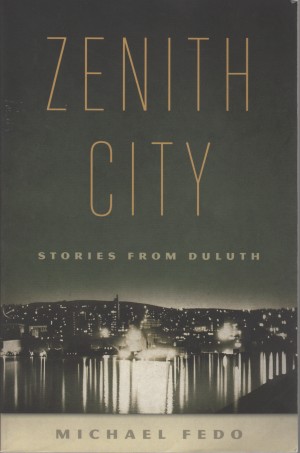
Zenith City: Stories from Duluth by Michael Fedo (2014. University of Minnesota Press. 9780816691104)
I was looking for a linear memoir so I bought this book. Why? Like all writers of a certain age, I am thinking about what my life has been, what I’ve experienced, the choices I’ve made, and whether in all that confusion, upheaval, surprise, lust, loss, and love, there are pearls of wisdom and/or stories that might strike readers as worthy of repetition. I should’ve read the back jacket of this book before I ordered it from the Bookstore at Fitger’s. Or done a bit more research. While there are indeed elements of autobiographical history strewn throughout this slim book, the pieces are essentially stand-alone essays, not connected chapters of Mr. Fedo’s well-lived life. And in that difference lies my disappointment.
Not that there are not some very, very powerful, humorous, or evocative tales within this volume. Though a bit off-putting, the beginning piece, “This is Duluth”, has some fine, fine moments. It reminds me, quite frankly, of discussions I had back in my adolescence with my buddies, when, having found my father’s stash of Windsor and having polished off the quart, the three of us, in our newly-found intelligence, composed a letter to the editors of the Duluth News Tribune about what a shit hole of a place Duluth was in the 1970s. That, as Fedo later reflects, has changed a bit. His introductory story, though, was a reminder of the blue collar/rust belt city that formed my youth.
“Miss Wedel and the Rats”, the second piece in the collection, felt truncated and flat. I’m not certain where the story went, but it did. “The Hill”, on the other hand, had me grinning with my own recollections of trying to climb some of Duluth’s steeper slopes in the ice coated depths of winter. Probably my favorite essay in the book, which essentially has absolutely nothing to do with the author, and hence, is an unlikely piece to be found in something bearing the moniker (on the back cover description) “”Fedo’s memories” because, well, there is nothing in the story that comes from the author’s life or memory, is “Joe Dimaggio”. That essay is a recounting of the slugger’s infatuation and eventual marriage to Duluth girl, Dorothy Olson. It’s tightly written, well crafted, and worth reading as a stand-alone story. It is also interesting to note that the Dimaggio essay had not been previously published, at least as disclosed in the “Publishing History” section at the end of the book. I liked the story a great deal, but, as indicated, in my search for a well-crafted memoir about Duluth well, the essay didn’t fit the parameters of my quest. Maybe that’s my fault. Maybe not.
Of all the pieces in the book, “Cousin Jean” struck me as the most authentic, the most revelatory in terms of memoir or personal history. The sadness depicted in Fedo’s retelling of his relative’s brush with greatness and subsequent fall, and his interactions with Jean over the years, was touching.
In the end, Fedo is a solid writer but I am uncertain what this collection was trying to accomplish. There are tales from the author’s youth that fit well in a memoir. There are other pieces, such as “A Life Formed By Lynching”, that don’t. Fedo’s recounting of his work on the book that eventually became The Lynchings in Duluth, and his chronicling of the actual event and the book’s journey to publication is important as a study of self-publishing, small presses, and charlatans as well, of course, of the horrendous history behind the tale. The piece is so strong, I would have enjoyed an expanded version of the trials and tribulations Michael went through in creating that book, rather than spending time reading a story about pyloric stenosis.
After finishing the last of the essays in my tent in the BWCA, I came to the conclusion that, for the most part, the stories told in this volume have merit but I remain uncertain as to whether they make sense in a collected work.
3 and 1/2 stars out of 5.


